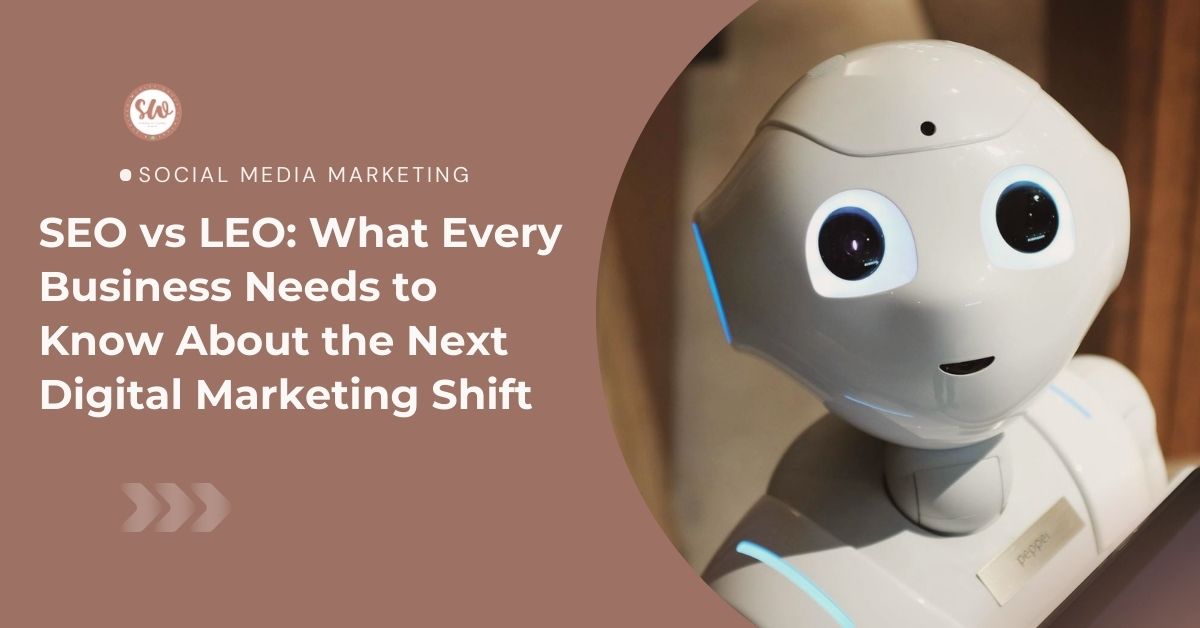- How to Avoid Hashtag Overuse and Spammy Tactics - September 12, 2025
- SEO vs LEO: What Every Business Needs to Know About the Next Digital Marketing Shift - August 23, 2025
- How to Use Facebook Groups to Build a Loyal Community - August 21, 2025
For decades, businesses have lived and breathed SEO (Search Engine Optimization). Ranking high on Google has been the golden ticket for traffic, visibility, and leads. But the digital landscape is shifting fast. Enter LEO — LLM Engine Optimization — the practice of optimising for Large Language Model engines like ChatGPT, Perplexity, and Claude. These AI-driven platforms are changing how people search, find, and trust information.
The reality? If SEO was about ranking in Google, LEO is about being cited, referenced, and surfaced by AI assistants. For businesses, that’s not just a small adjustment — it’s the next major marketing shift.
What Is SEO and Why Has It Worked So Well?
SEO is the process of optimising websites to appear prominently on search engines like Google and Bing. It focuses on technical structure, keyword targeting, backlinks, and content that aligns with what users are searching for. Businesses have invested billions into SEO strategies because it delivers measurable ROI: when you rank on page one, customers find you.
The SEO model relies on keywords + relevance + authority. Google evaluates pages using algorithms, rewarding those with quality content and strong signals of trust. For years, the formula has worked. But the rise of AI assistants has introduced a new layer that SEO alone doesn’t cover.
The Rise of LEO (LLM Engine Optimization)
Unlike traditional search engines that return a list of blue links, LLMs (Large Language Models) generate direct, conversational answers. Users aren’t clicking through multiple sites; they’re asking a question and expecting one concise, trustworthy response.
This shift means that the winner-takes-all dynamic is even stronger. Instead of being one of ten search results on page one, your business must be the source an AI chooses to reference. That’s where LEO comes in.
LEO focuses on:
Making sure your brand, products, and expertise are accurately represented in AI training data.
Creating content that is structured, authoritative, and context-rich so LLMs surface it when generating responses.
Building credibility across platforms that feed into AI engines, such as Wikipedia, high-authority news sources, directories, and verified websites.
Why Businesses Can’t Rely on SEO Alone Anymore
Here’s the big shift: consumers are no longer only searching Google. They’re asking AI engines for recommendations like:
“What’s the best advertising agency in Las Vegas?”
“Which marketing agencies in Las Vegas can help with bilingual campaigns?”
“What’s the best SUV for families in 2025?”
If your business doesn’t appear in those answers, you may lose visibility even if you rank well on Google. LEO ensures that your company is recognised as a credible source across the AI ecosystem.
For example, if you’re a law firm, AI assistants won’t simply list your website — they’ll summarise case studies, client reviews, and authoritative mentions. If you haven’t invested in building that digital footprint, you risk invisibility in this new landscape.
How to Optimise for LEO
Optimising for LEO requires a mindset shift. Instead of only asking, “How do I rank for this keyword on Google?”, you must also ask, “How do I ensure an AI cites me as an authority?”.
That means:
Publishing authoritative content that answers questions in a clear, structured way.
Strengthening your presence across high-authority platforms that LLMs are more likely to trust.
Leveraging structured data and knowledge graphs so engines understand and contextualise your brand.
Building brand trust signals such as media features, strong reviews, and verifiable expertise.
Want to future-proof your marketing strategy? Discover how to optimise your business for both SEO and LEO.
The Business Advantage of Adopting LEO Early
Just like SEO in the early 2000s, businesses that move fast with LEO will have a competitive edge. AI adoption is accelerating, and consumer behaviour is shifting with it. If your business becomes an authoritative voice in AI-driven answers now, you’ll capture attention while competitors scramble to catch up later.
Think of it as digital real estate. With SEO, it took years for businesses to understand the value of ranking. With LEO, the stakes are even higher — fewer spots, more competition, and a faster-moving landscape.
SEO and LEO: A Complementary Approach
It’s not about choosing one over the other. SEO and LEO work together. Strong SEO still matters because AI engines draw on web data, and Google rankings remain a key visibility channel. But LEO ensures you’re not left out when consumers switch from typing a query into Google to asking an AI assistant directly.
The smartest businesses will integrate both. Think of SEO as making sure you’re visible on search engines, while LEO ensures your brand shows up in the next generation of AI-driven recommendations.
The Next Digital Marketing Shift
The shift from SEO to LEO is not hypothetical — it’s already happening. Businesses that ignore it risk being invisible in the places where customers increasingly make decisions.
At SW Marketing & Consulting, we help brands prepare for this shift. As a bilingual marketing agency specialising in both English and Spanish markets, we combine data analysis, strategic planning, and cross-cultural execution to position your brand where it matters — whether that’s Google search results or AI-driven engines. Our expertise in target profiling, media planning, and buying ensures your message not only reaches the right audience but resonates across cultures.




